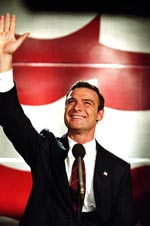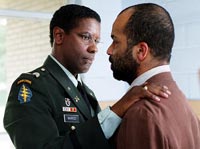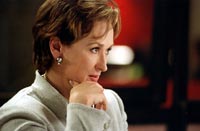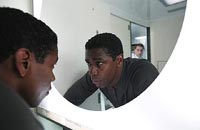Calling a film one of the great remakes of all time sounds like faint praise indeed. Most celluloid retreads are bad ideas, badly executed. Either the first go-round wasn’t all that good—so why waste everybody’s time and money again? Or it was truly great, and the new version is at best a decent knockoff—so why bother? Just watch the original.
Not so with Jonathan Demme’s new treatment of The Manchurian Candidate. Rent the 1962 version, by all means—this classic Cold War thriller was released last week as an affordable DVD—but mostly so you can see how dazzlingly inventive a remake can be.

This time around, a Desert Storm recon mission is ambushed and, after a few days missing in action, the soldiers find their way back to safety with only a couple of casualties, earning Sgt. Raymond Shaw (Liev Schreiber) a Medal of Honor and an eventual nomination to the vice-presidency of the United States. One problem: two of the other survivors start having terrible nightmares that suggest the whole thing may never have happened. Or, at least, that it happened very differently.
The further the story progresses, the more obvious it becomes that this really is the right movie at the right time—again. In 1962, with Cold War anxieties everywhere, McCarthyism a not-distant-enough memory and the Korean conflict a pretty good stand-in for the escalating troubles in southeast Asia, a movie about a war hero who’d been brainwashed by the Reds and placed like a time-bomb in the center of the American democratic process was close enough to plausible to send real shock waves through a fearful nation.

In 2004, we’re again preoccupied with enemies on the home front, confronted with the very real threat of neighbors who may turn out to be terrorists, an anxiety that’s only compounded by an unsettling mistrust of governments and government agencies—not to mention multi-national corporations, who prove to be the real Bad Guys this time around. Now Manchuria isn’t a place, it’s an entity—Manchurian Global, a vast organization that buys and sells everything under the sun, presumably including private armies, biotechnology and the souls of politicians. We trust these men in suits like we trust the guys from Enron, or the organized crime families they are made to resemble. Pictures of burning Kuwait oilfields are to the Second Gulf War generation what Korean images were to almost-draftable Baby Boomers in ’62, and a street-level remake of “Fortunate Son” invokes that very specific, cynicizing Vietnam-era helplessness and rage. Our latest traumas get stirred up when video experts review security tapes of assassins making their way through metal detectors. This is a Manchurian Candidate for a new—and newly fearful—generation.
It’s eerie to revisit the highly-praised original, and realize that its scenario of covert manipulation and presidential assassination plots screened in America a year before the JFK shooting—and the endless conspiracy theories it spawned. The savvy ’04 edition plays on all those fears and more: knowing references to lone gunmen and homeland nuclear risks evoke Cold War worries that seem suddenly pertinent again, and one character makes a compelling (and troubling) argument when she says “Americans are terrified, and we can arm them”—with a war hero as Vice President. Set slightly in the future, background news broadcasts ratchet up the tension with reports of suicide bombers and War On Terror rhetoric, suspension of civil liberties and U.S. raids on African countries, “touch screen voting” protests and security crackdowns.

Audiences who don’t know the original are guaranteed a tense and tricky ride, pretty much free of the gaping plot holes that usually mar these twisty suspensers. If you’re willing to suspend your disbelief to buy the admittedly goofy idea at the center of the story—”Sci-Fi Lite” in a Michael Crichton sort of way, no less implausible than the brain-washing premise of the original—the actual story mechanics and character motivations hang together remarkably well.
If you do know the original, chances are you’ll enjoy yourself even more. Apart from the fact that card games make only a token appearance, it is astonishing how many story elements are intact, how many of the memorable set pieces remain—though they’re almost always inverted or subverted somehow. The film begins with a barrage of recognizable touch-points to the original—character names and situations, slightly rearranged or deftly adapted to the more-than-modern setting, a fireworks display of inventiveness along the lines of a Baz Luhrmann Romeo + Julet. The fresh-but-faithful approach is never more charming than in the Eugenie-Rosie dialogue, which comes straight from the original (in fact, it’s right out of the Richard Condon novel), right down to the Eldorado phone number she gives him, “the old-fashioned way.” In the early sixties, Senator Iselin dressed up like Abraham Lincoln: now, presidential candidates get carved into digital Mount Rushmores. We even get a nod in the direction of the “go jump in the lake” scene, all its jokiness gone.
But just as we make this out to be a clever but essentially straightforward updating—perhaps a sort of reverent tribute by producer Tina Sinatra to Dad, who starred in the first edition—screenwriters Daniel Pyne and Dean Georgaris take a series of sharp, shocking turns and we realize everything’s up for grabs. The story heads wildly and unpredictably off in several of its own directions, and even when the old and new story-lines converge again in the final half hour, nothing means what it used to mean because all the rules and roles have changed. Masterful.

Angela Lansbury was Oscar nominated for her portrayal of the character who, curiously and significantly enough, is never named, referred to only as “Raymond’s mother.” Even that fine performance is out-shone and out-nuanced by Meryl Streep, who brings a flirty sexual energy to the role that makes just that much more sense of the novel’s Oedipal psychologizing, and she’s got the intellect to convince us that this woman can sway electoral strategy committees as readily as she can a son who mostly hates her. Her mix of sexuality and vaulting ambition is perfectly realized, just attractive enough to be all the more deeply repellant: Streep finds in Senator Shaw everything that would make for a truly great Lady Macbeth. Both Liev Schreiber as son Raymond and Denzel Washington as the whistle-blowing Ben Marco succeed in creating more complex and believably human characters than their predecessors.
The sound score is a marvel, often using collages of odd and out-of-context sounds rather than music to create a disquieting atmosphere. Cinematographer Tak Fujimoto reteams with Silence of the Lambs director Demme for loads of visual style, from the only-slightly-revved-up TV news graphics to suggestions of other films and filmmakers—you’ll spot Hitch and Coppola, Seven and Memento. (I wonder what other collective fear is being manifested in all the memory-loss movies of recent years, right up to recent films like Eternal Sunshine of the Spotless Mind and 50 First Dates). And the “politics as show biz” themes of John Frankenheimer 1962 Manchurian Candidate—with its way-ahead-of-MTV editing of the nominating convention—comes into its own in this much-higher-tech 21st century treatment.
We’re too knowing to be surprised by anything this movie has to say. But that’s not a problem: this movie doesn’t set out to teach, but to entertain. It’s playful. The thing is, what it’s playing with are ideas, and they’re important enough to bear thinking about just now. What it’s playing on are our fears. And they’re real enough, and worth addressing.
At the end of the film, one character remarks that there are always casualties in war. And maybe we’re meant to think about what somebody else said—that in war, the first casualty is always the truth.
A timely movie indeed.
Talk About It
Discussion starters- The Bible mentions “principalities and powers” ( Eph. 3:10, 6:12; Rom. 8:38, Col. 1:16, 2:15; Titus 3:1), sometimes referring to spiritual forces, other times to earthly organizations—perhaps even large corporations or governments. How do such verses apply to the “principalities and powers” portrayed in this film?
- One character uses religious language in claiming to be morally superior to executives from Manchurian Global, saying, “Your god is money. But I’m a believer.” A believer in what? How do our ideals become idols?
- Near the end of the film, one character appeals to another on the basis of “something deep inside,” a compassion and humanity that circumstances have not been able to erase. Another character says “I made a decision when I met you.” What decisions are made in the climax of the film to confirm or deny these characters’ faith in the goodness of others? What do you think about these intuitive perceptions of people’s “true nature”?
The Family Corner
For parents to considerThe R rating comes mostly from a few instances of pretty hard-to-watch violence toward helpless people—suffocation, strangling, drowning—and a head operation that’s not bloody or gory but can make audiences squeamish. There is also a sexual subtext between Eleanor Shaw and her son, including a kiss that’s more than just “motherly.”
Photos © Copyright Paramount Pictures
What Other Critics Are Saying
compiled by Jeffrey Overstreetfrom Film Forum, 08/05/04Director Jonathan Demme, who turned Hannibal Lecter loose in 1992’s The Silence of the Lambs, concocts a nameless, faceless villain in his re-imagining of the 1962 classic thriller The Manchurian Candidate.
In the original, a Communist plot put a presidential candidate in danger, and a brainwashed soldier (Frank Sinatra) had to regain his repressed memories of Korean War traumas in order to uncover the truth and stop a programmed assassin (Laurence Harvey).
In this version, it’s a conspiracy of corporations that threatens the candidate, and a haunted soldier (Denzel Washington) must get his Gulf War memories back in order to properly expose the killer. Behind the scenes, a malevolent senator (Meryl Streep, vamping it up in the famous Angela Lansbury role) is managing the political career of her son, a war hero named Raymond Prentiss Shaw (Liev Schrieber in an Oscar-worthy supporting turn). Shaw is a rising star, famous for Gulf War heroics. But the closer the country gets to the election, the more he proves he’s the one to put the “vice” in “vice president.”
Jonathan Demme’s version is not really a re-make. His screenwriters have concocted a substantially different story that stoops to more crowdpleasing moments, sensationalizes the spookiness of the conspiracy, and yet is somehow more relevant to our generation today than the original was to its own. Demme’s direction focuses the film into a serious, character-driven thriller that confounds our expectations and draws us to the edge of our seats, even as we recoil in horror at the resemblance between our own world and this fictional, Kafka-esque nightmare. My full review is at Looking Closer.
Kevin Miller (Hollywood Jesus) asks, “Could there be a more appropriate time for a film like this? Released one month after Fahrenheit 9/11 with conspiracy theories about George W. Bush … running at an all-time high, The Manchurian Candidate is a masterpiece of cinematic timing. Thankfully, it is also a great movie. This remake retains all of the suspense of the original but updates the context so that it has that ring of truth that makes you believe something like this really could happen—almost.”
Ron Reed (Christianity Today Movies) calls it “one of the great remakes of all time. This really is the right movie at the right time—again. In 2004, we’re again preoccupied with enemies on the home front, confronted with the very real threat of neighbors who may turn out to be terrorists, an anxiety that’s only compounded by an unsettling mistrust of governments and government agencies—not to mention multi-national corporations, who prove to be the real Bad Guys this time around. This is a Manchurian Candidate for a new—and newly fearful—generation. What it’s playing on are our fears. And they’re real enough, and worth addressing.”
Michael Elliott (Movie Parables) praises “solid direction by Demme, a taut, intelligent script by Daniel Pyne and Dean Georgaris, and three strong performances by Washington, Streep, and Schreiber. The film works mainly because it taps into the paranoid fear and anxiety caused by the ever-growing disillusionment and distrust of governmental power and the people who covet and wield it.”
J. Robert Parks (Phantom Tollbooth) says, “It’s rare to see a movie actually engaged with present-day issues, so we’re willing to forgive many of its mistakes. Only diehard Democrats will equate Raymond Shaw’s character with our current vice president, but the movie’s points about how candidates manipulate fear for their own devices is incredibly relevant. In addition, the odd pairing of security and freedom is exposed for the empty propaganda that it is. In the end, the movie’s politics might be more satisfying than its story.”
Predicting Oscars for Denzel Washington and Meryl Streep, Annabelle Robertson (Crosswalk) says, “The only redeeming feature about this ultra-liberal message” is that the villain “looks, dresses, walks, and talks exactly like [Hillary Clinton].” She also includes a list of “objectionable content,” warning viewers of things that could offend them like “offscreen nudity.” (Offscreen nudity?)
Here are a few more “redeeming features”: a cautionary message about the corrupting nature of power; a story that underlines the importance of honesty, humility, selflessness, and courage; first-rate performances; vivid and energetic cinematography; a powerful score by Rachel Portman; and a timely reminder that we should not just idly accept the commercials for presidential candidates, but become vigilant and ruthless in our endeavors to attain the truth and make a wise, responsible decision for the future of our country. The Manchurian Candidate may have some outrageous science fiction elements, but like the best science fiction, it employs metaphors that reward close attention.
Cliff Vaughn (Ethics Daily) is impressed. He calls it “creepy” and praises the “dead-on performances from all of the principals” which “combine to establish an incredibly relevant and moody political thriller. Washington and Streep are always good, but Liev Schreiber, who has been doing solid work for years, steals the show. Perhaps this film will elevate him to the A-list of Hollywood actors, where he firmly deserves a place.”
Vaughn also identifies valuable themes in the film. “It also takes what should really upset us and doesn’t—big business in bed with government, for example—and serves it back to us with the appropriate fright factor.”
Frederica Mathewes-Green (National Review) says the remake is far inferior to the original. From her point of view, the film isn’t suspenseful at all. “Without suspense, this version doesn’t have much going for it. It’s a spectacle of noise and blood, without the psychological subtext that made the first film far more disturbing. Every alteration in the new version is a change for the worse.”
Tom Neven (Plugged In) says, “There’s little overall menace in this film. That doesn’t diminish the movie’s taut plot and the paranoid sense of uncertainty felt by the main character. It has enough blind alleys and tantalizing twists to keep viewers on the edges of their seats and uncertain until the very end. What does diminish it is the graphic—sometimes gratuitous—violence and spatterings of crude language that’ll force most families to vote against this candidate at the box office.”
Most mainstream critics are impressed, and some praise it as one of those rare remakes that equals the original.
from Film Forum, 08/12/04Looking at the recent re-imagining of The Manchurian Candidate, Andrew Coffin (World) says it “works pretty well as a thriller. Despite some truly memorable scenes and a fantastic finale, the cultural context and language of film has changed so much since the original Manchurian was released that it will appear hokey and unconvincing to many modern viewers. The remake retains much of the original’s paranoia while utilizing some of the best tools of the modern thriller. Mr. Washington is, as always, an entirely convincing protagonist, and Ms. Streep gives Ms. Lansbury a run for her money as an incestuous, creepy mother figure.”
Josh Hurst (Reveal) says, “All in all, The Manchurian Candidate is a taut, intense thriller, crafted by a master of the genre, that will leave you exhilarated and perhaps a little confused. (But in a good way). It might even lead you into deep thought about the corruption that can come with power and the consequences of finding the truth. That’s an awful lot to expect from a summer movie, but this Candidate delivers.”
Denny Wayman and Hal Conklin (Cinema in Focus) say the movie’s “disturbing in both its manipulation of our fears and the manipulation it suggests could be possible in our world. [It’s] is a psychological thriller that is hard to enjoy.”
But Dick Staub (CultureWatch) says the film fails due to an obvious political bias. “The execution of the political bias comes across as propaganda, not art.” He concludes that it “suggests we can root out evil by exposing the bad guys in the military, politics and big business.”
Michael Karounos (Christian Spotlight) writes, “The film avoids using the terms ‘Republican’ or ‘Democrat.’ Instead, it uses racial coding. Ever since [The Matrix], films have featured black characters conspicuously exercising authority over weak or venal white characters. All the evil guys are white males … and all the black characters are shown demonstrating either physical or moral authority over them. This has become a familiar leftist trope.”
Copyright © 2004 Christianity Today. Click for reprint information.












